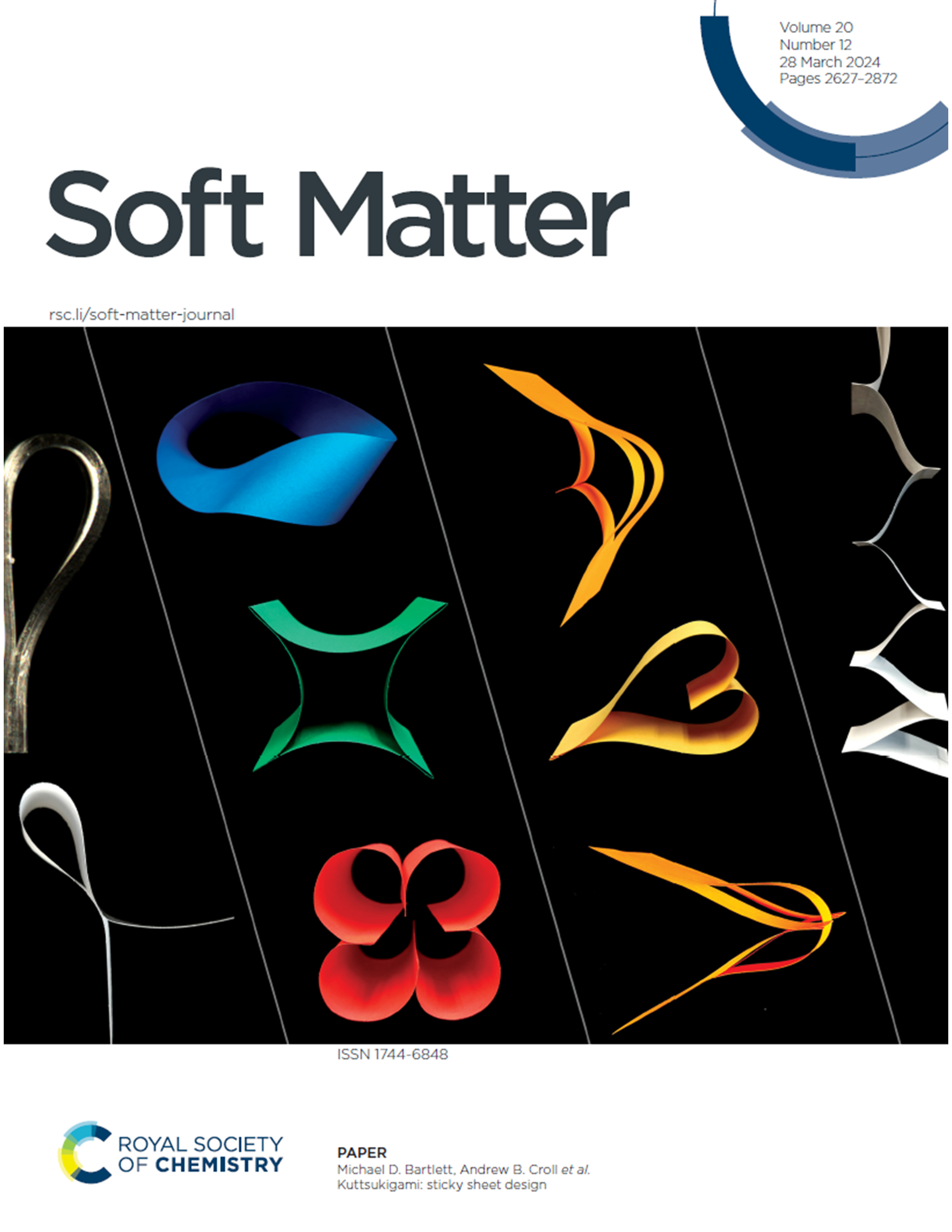Recent News and Events
Croll Group Work on Journal Cover
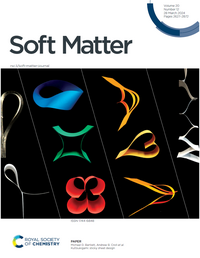
The Croll group has recently published a paper entitled "Kuttsukigami: Sticky Sheet Design" in the journal Soft Matter. The project was a collaboration between graduate student Tim Twohig, faculty member Andrew Croll here at NDSU and Post-Doctoral Researcher Ravi Tutika, Ph.D. student Wuzhou Zu and faculty member Michael Bartlett at Virginia Tech. The work outlines a new method for creating structure with thin sheets, akin to origami, but with advantages such as the inclusion of a broader range of materials and reusability. The authors also point out how adhesion can be used to measure the mechanical energy stored in complex thin structures, such as the mobius strip. The editors liked the images throughout the work so much they featured the groups work on the journal cover.
SPS Club Honored!
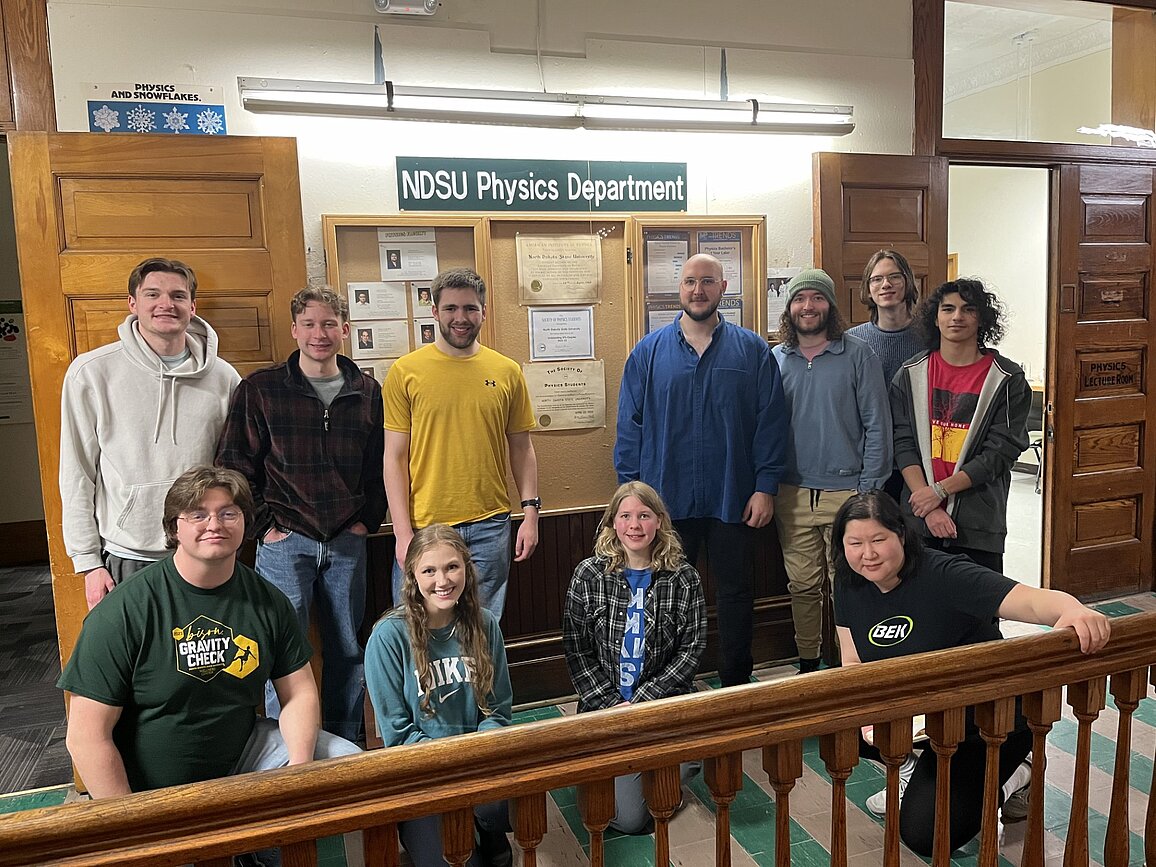
The North Dakota State University (NDSU) chapter of the Society of Physics Students (SPS) has won an Outstanding Chapter Award from the SPS National Office. This is the first time the chapter has been recognized for its excellence as a top-tier student-led physical sciences organization, a designation given to fewer than 10 percent of all SPS chapters at colleges and universities in the United States and internationally.
The Society of Physics Students is a professional association designed for students. Membership is open to anyone interested in physics and related fields. SPS operates within the American Institute of Physics (AIP), an umbrella organization for professional physical science societies.
The SPS chapter at North Dakota State University is a student organization, supported by the Department of Physics, advised by Professor Alan Denton, and led by dedicated student officers:
William Tupa, Physics and Mathematics, '24 Sigurd Saude, Physics and Mathematics, '25
Jessica Tsao, Physics and Mathematics, '24 Isabel Wills, Mathematics and Statistics, ‘24
Jacob Hubbard, Physics, '24 Joseph Granlie, Physics, ‘23
“This award is such an honor for all of us at our SPS chapter. It's been wonderful to engage with our peers and mentors at student meetings and conferences. The most rewarding aspect is being able to share my interest in physics with others, and SPS has helped me do that,” said our current chapter President Sigurd Saude.
SPS chapters are evaluated based on their level of interaction with the campus community, the professional physics community, the public, and with SPS national programs. The Outstanding Chapter Award recognizes high levels of outreach as well as unique approaches to fulfilling the mission of SPS to “help students transform themselves into contributing members of the professional community.”
The NDSU SPS chapter was recognized as outstanding in part for its efforts in organizing and hosting a meeting of SPS chapters from Zone 11, which includes North Dakota, South Dakota, Minnesota, Iowa, and Nebraska. With financial support from the SPS National Office, Physics students from the region engaged in campus tours of research labs in the R1 building and of NDSU’s high-performance computing center (CCAST), enjoyed an astronomy talk by Professor Wayne Barkhouse (University of North Dakota), shared their research in a poster session, and competed in a fun egg-drop contest. The NDSU students were also recognized for attending the 2022 Physics Congress (PhysCon) in Washington, D.C., the largest gathering of undergraduate physics students in the United States, and engaging in several science outreach events, including Science Fun Night at Longfellow Elementary School, ND State Science Olympiad hosted by NDSU, and a Drone Discovery Day on campus.
Additional Funding for Physics Research
The Croll group, as part of a large collabouration between researchers in NDSU's coatings and polymeric materials department as well as researchers at Iowa State and the University of Michigan, has secured funding for the project "Using Artificial Intelligence (AI) and Machine Learning (ML) for Designing Functional Coatings" from the Office of Naval Research. The grant, totalling $4,821,764, will pay for many graduate students and the infrastructure they need to be successful in their research. The work will investigate how to design coatings that can minimize the adhesion of water born foulants as well as other solids like ice.
Grad Phi Carves Pumpkins
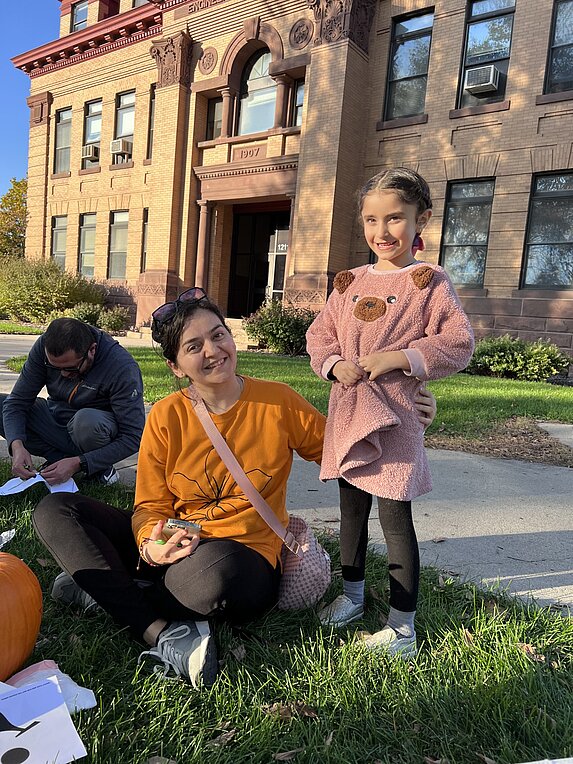
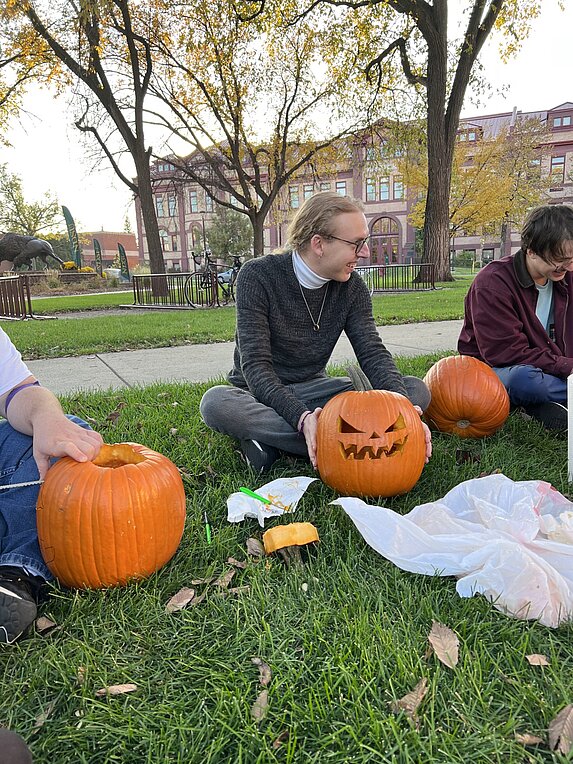
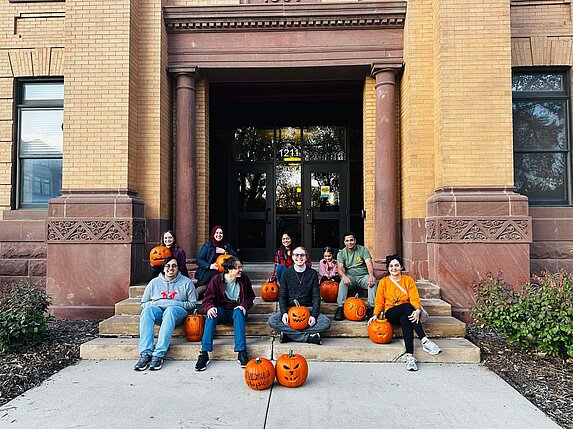
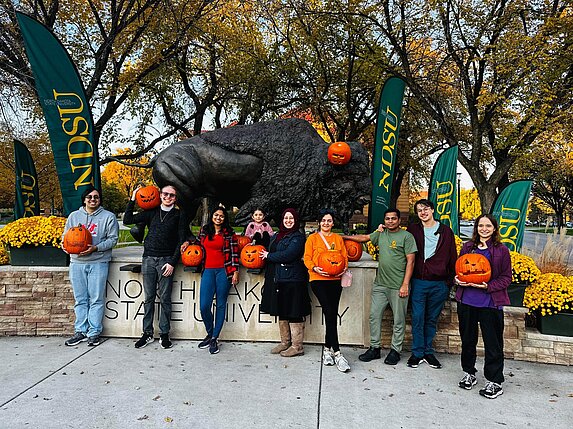
Recently, students of Grad Phi have been celebrating Halloween by carving pumpkins to decorate the building. For some, this is a new experience, for some it is not, but for all it was good time! Thanks for the decorations everyone!
Discipline Based Education Research Receives Funding
The NDSU Discipline-Based Education Research (DBER) community was just awarded a three-year, $1.2 million grant under the NSF STEM Edu OPRF Solicitation. Collaborations in Discipline-Based Education Research (CiDER) will bring a cohort of four postdoctoral research associates to NDSU to train in DBER with our nationally known faculty.
Importantly, this grant underscores our DBER community’s continued dedication to developing and implementing reflective and responsive training programs that engage trainees in a community of practice and enable all to succeed. NDSU continues to be a national leader in DBER, serving as a model for collaborative, interdisciplinary research in STEM teaching and learning. Our work spans the educational continuum beginning with our undergraduates REU program, culminating in postdoctoral training to launch trainees into their careers.
NDSU's Physics department hosts 3 faculty members associated with the grant, co-Primary Investigator Mila Kryjevskaia, co-Primary Investigator John B. Buncher and affiliated faculty Warren Christensen.
Dr. Yongki Choi Receives NSF Grant for Biphysics Research
Associate Professor Yongki Choi has just received a major NSF grant to conduct biophysics research. The grant, entitled "Protein Manipulation and Engineering with an Electronic Biochemical Approach", brings $357,000 to NDSU which will fund graduate students in Prof. Choi's research group as well as pay for materials needed to acomplish the work. The project will use the Choi group's single-molecule nanocircuit platform to watch proteins fluctuate between slightly different conformations (shapes). His goal is to find ways to manipulate the protein's dynamics that might be helpful in fighting disease.
Drone Discovery Camp!
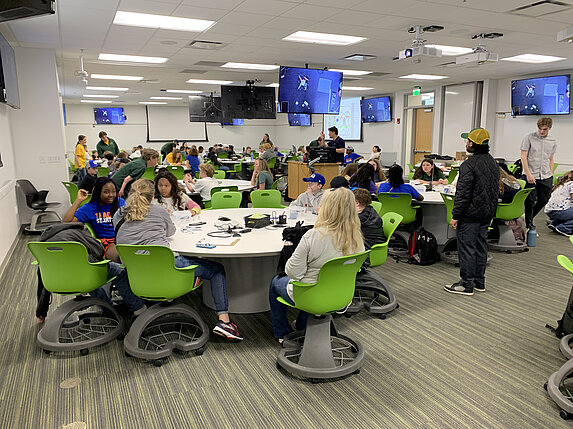
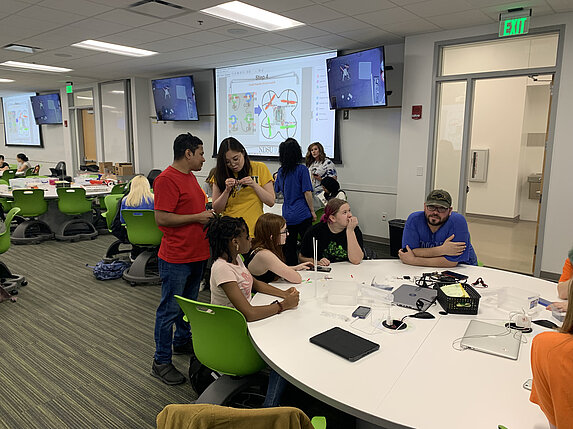
This spring Professor Yongki Choi hosted the first "Drone Discovery Camp" to help local k-12 students learn about building and controlling a drone. Students met up on the NDSU campus and Prof. Choi, with the help of many undergraduate and graduate students, lead them through the exercise. The program is timely given the importance of drones and related technology to the modern world. Very exciting time for all!
Science Fun Night!
Once again the Society for Physics Students club, as well as several faculty members, met up with Longfellow Elementary students for a Science Fun Night! By all accounts fun was had by all, and hopefully, some neat science was learned!
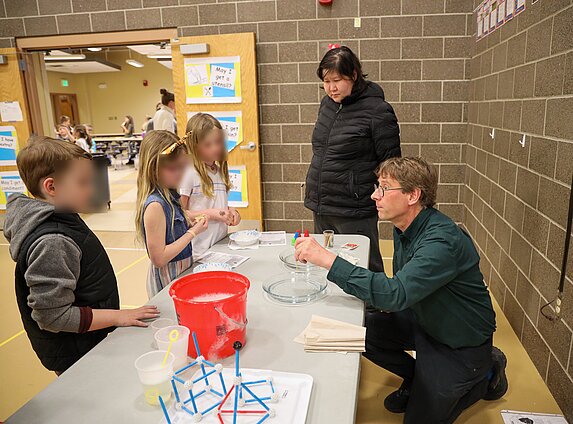
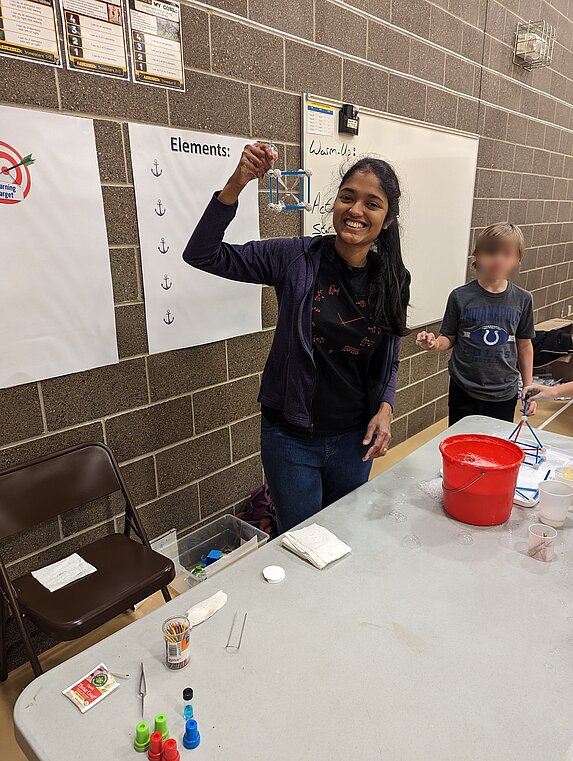
SPS Club Hosts Regional Meeting
This weekend (March 24-26) the NDSU Society for Physics Students (SPS) chapter (led by William Tupa, Sigurd Saude, Joseph Granlie, Jessica Tsao, and Jacob Hubbard) organized and executed a very successful SPS Zone Meeting! NDSU is part of the five-state region known as Zone 11 (North and South Dakota, Minnesota, Nebraska, and Iowa). From this region, about 30 students converged on Fargo, many driving from as far away as Lincoln, NE and Rapid City, SD.
The SPS organized many different events for their guests. These incuded tours of the NDSU high performance computing facilityCCAST, and the materials and nanotechnology labs in the new R1A building (Yongki Choi, Andrew Croll, and Erik Hobbie), an excellent research presentation about globular clusters from Dr. Wayne Barkhouse (Physics and Astronomy, UND) and a poster sessions open to all attendees. By all accounts, the attendees had a wonderful time. Great work showingn off NDSU physics SPS club!
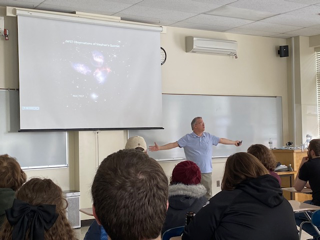
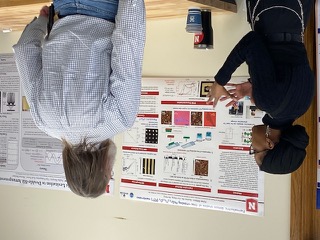
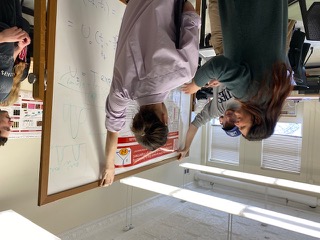
Adjunct Faculty Member Publishes Discovery!
Khang Hoang, and adjunct faculty member of the physics department, has made an advance in the understanding of certain fluorescent (glow in the dark) paints. Read about it in a piece published by NDSU!
Croll Group Receives New Funding
A new grant has recently awarded to Fardad Azarmi (Mechanical Engineering Department) and Andrew Croll (Department of Physics) to develop a new type of adhesive device to aid in Army maintenance. The project "Demonstration of Dynamic Adhesion Strength for Maintenance and Sustainment Environments" will be developed here at NDSU in the Engineering and Materials research labs in partnership with the National Center for Manufacturing Sciences and the United States Army. The grant provides a little more than $896 000 to pay for the equipment and personel (graduate and undergraduate students) needed to perform the work. The researchers hope to create feasible devices over the next 2-3 years, but public announcements will be quiet due to the export controlled nature of the work.
Physics Student's Work on Journal Cover!
Wathsala M. A. Jayawardana has just published her first, "first author" paper as a Ph.D. student here at NDSU. Her work just appeared in the journal Soft Matter and describes what is different when a sheet is crumpled into a ball if the sheet first has many "button-hole" like cuts added to it. Short answer is, not much! This is interesting because an ordinary sheet crumpled into a ball forms a very stiff state, that many have assumed has something to do with "jammed" internal structures within the ball. Wathsala, however, showed that the same macroscopic outcome (the same stiff structure) occurs even when cuts dramatically alter the internal structure of the ball. Her hard work has even been rewarded with a cover image! The paper is open access and free to read (click here), and the image can be seen on the journal's website. Great work Wathsala!
Grad Student Work Receives Recognition!
Physics graduate student Hadassah Griffin received an "Outstanding Poster Presentation" award at the 2023 Red River Valley American Chemical Society Research Event held at Concordia College this January. Her poster “Janus-like Quantum Dot Interface Charge Transfer Properties With and Without a Bond Connection Through Space” outlined work she has been doing with her advisor Andrei Kryjevski and their collabourator Dmitri Kilin. Great work Hadassah!
Two Teams Place BRONZE!
This fall, two teams of undergraduate students competed in the University Physics Competition. In this event, teams from across the country work over a weekend to solve an interesting, real-world physics problem. Teams work very hard, and their solutions are then judged by the organizing committee. Check out more at the website for more details.
From our Department, six students competed as two teams:
The team of Joseph Granlie, William Tupa, and Sigurd Saude tackled Problem A – Deflecting an Asteroid.
The team of Ibrahim Bukhari, Ahmed Aldrees, and Matthew Hansen tackled Problem B – FIFA Penalty Kicks.
Both teams placed at the Bronze metal level! This is an amazing result, congratulations to both teams! To explain how well they did, consider the explaner from the University Physics Competition website:
“Of the 417 papers submitted [from around the world] in this year’s University Physics Competition, 7 teams (1.7%) were ranked as Gold Medal Winners, 79 teams (19%) were ranked as Silver Medal Winners, 108 teams (26%) were ranked as Bronze Medal Winners, and 223 teams (53%) were ranked as Accomplished Competitors.”
Students Travel to DC
From October 6-9, four undergraduate Physics students traveled to Washington, DC to attend the national Society of Physics Students Physics Congress (“PhysCon 2022”). The students heard presentations from distinguished physicists, met other Physics students from around the country, presented posters on their research and outreach activities, and toured national labs (NIST, NASA). The trip was made possible by donations to the physics department.
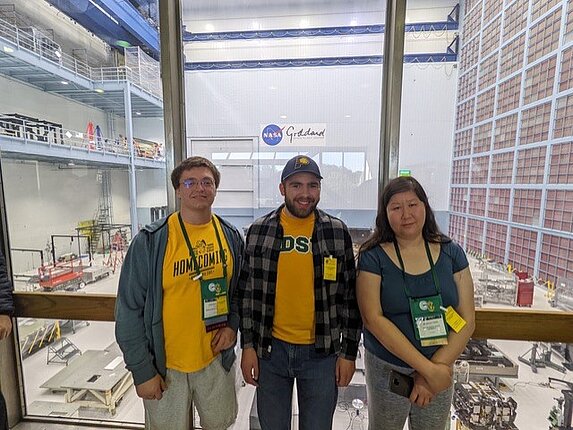
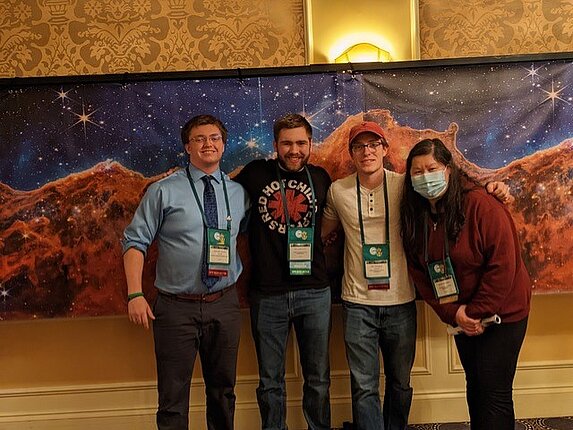
Dr. Yongki Choi Starts STEM outreach activity
Associate Professor Yongki Choi was awarded an ND EPSCoR K-12 Outreach Award, in the amount of $8,000, to develop a STEM event for middle and high-schoolers called “Drone Discovery Day.” Yongki hopes the work will inspire young people to take an interest in STEM and seek careers in STEM down the road. More STEM students will lead to a more prepared workforce for the future of North Dakota.
Faculty Member invited to Share Education Research
Associate Professor Warren Christensen has been invited to be a plenary speaker at the 2023 Conference on Research in Undergraduate Mathematics Education (RUME). The conference will held in Omaha, NE Feb 23-25th, 2023. Dr. Christensen's research has been focused on the intersection of Mathematics and Physics Education Research for his 13-year career at NDSU, and he's honored by the opportunity to speak at this national meeting.
Faculty member interviewed by Foundation magazine
The NDSU Foundation interviewed Dr. Mila Kryjevskaia (along with VP Research Colleen Fitzgerald and a graduate student from Psychology) for a story in the Fall 2022 issue of their magazine, Foundation, about research, NDSU’s R1 status, and philanthropic support for research. Read more here:
Dr. Mila Kryjevskaia Receives major NSF grant!
Dr. Mila Kryjevskaia, together with co-PI Dr. Alexey Leontyev (Chemistry and Biochemistry), was awarded a highly competitive NSF grant for $800K over five years from the Division of Undergraduate Research, Improving Undergraduate STEM Education program. The project, entitled "Developing, Testing, and Disseminating Reasoning Chain Construction Tools for Introductory Physics and Chemistry Courses,” will develop tools to better understand and improve college students' reasoning skills in the context of chemistry and physics courses. Mila has also been invited to speak on a panel during Homecoming Week at a luncheon with NDSU trustees and other guests.
Faculty Member heads American Physical Society Topical Group!
Dr. Mila Kryjevskaia has recently been elected by her peers to serve as tje elected chair of the American Physical Society Topical Group on Physics Education Research. Service to the profession is an imporant part of being a professor, and serving at a national level is a great way to bring recognition to NDSU. Dr. Kryjevskaia has been a dedicated researcher in the field for many years, so her expertise is sure to produce excellent leadership for the Topical Group.
Undergraduate Landon Johnson publishes a paper with Dmitri Kilin
Physics undergraduate student Landon Johnson has published a paper based on his capstone project work in the peer-reviewed journal RSC Advances. The work, entitled "Effect of ligand groups on photoexcited charge carrier dynamics at the perovskite/TiO2 interface" was guided by Dmitri Kilin, a professor in the Department of Chemistry. Great work Landon!
Alan Denton and Wyatt Davis's paper selected as an "Editor's Pick"
Professor Alan Denton and Graduate Student Wyatt Davis have recently published a paper entitled ""Influence of solvent quality on depletion potentials in colloid-polymer mixtures" in the Journal of Chemical Physics. The work, part of a special collection on Depletion Forces and Asakura-Oosawa Theory, was specifically highlighted by the editor because the editor felt the work "presents significant and definitive research in experimental or theoretical areas of the field". Quite an honor! See the paper here, it is open access for a year! As always, professors are happy to send a paper to you if you do not have access to the journals directly!
Mila Kryjevskaia publishes in Physics Today
Mila Kryjevskaia and here collabourators Paula Heron and Andrew Heckler have published a paper entitled "Intuitive or rational? Students and experts need to be both" in the magazine Physics Today. Physics Today is the top generalist publication of the american physical society, which publishes articles of interest to physicists at all levels. The magazine is not opent to general submissions (as are most academic publications), so being invited to publish a work at Physics Today is an amazing honour. The paper, which is a very interesting discussion of dual-process reasoning theories applied to the world of physics teaching, can be accessed here. If you have any trouble accessing the work, reach out to any faculty member who would be more than happy to send you a PDF copy to read (or join the American Physical Society and read Physics Today each month).
Alan Denton's Service to University Honored
Professor Alan Denton has been awarded the 2021 "College of Science and Mathematics Service Award". This is a great recognition of all of Alan's contributions to the running of the university at all levels (Community, University, College, Department). Of particular importance to the Physics Department are Alan’s unwavering commitment to inclusion and equity in growing the graduate program in our department, and Alan’s leadership in developing outreach opportunities in order to bring joy and appreciation of science to our local community. Thank you, Alan, for all you do!
NSF funds Croll Group Research
This fall Principle Investigator (PI) Andrew Croll was awarded a $240,256 grant to investigate "Advanced Adhesion from Origami Inspired Thin-Film Mechanics". The work centers on discovering, explaining, and using thin films to create adhesive devices that can withstand rough substrates (try using tape on a rough brick) or devices that can switch from low to high adhesive states (on-off adhesion). Thin films are easily bent but are often difficult to stretch (try to stretch a sheet of paper). This contrast in physics is exploited through origami design, where sheets are easily bent into a configuration that can direct stress along the sheets dimensions.
Theresa Elder, a Materials and Nanotechnology graduate school has authored the first paper funded by the work titled "Adhesion of a Tape Loop". In this paper, Theresa explains the shape a thin sheet initially made into a cylindrical loop takes on as it is increasingly confined between two parallel walls. The paper also garnered the 'inside back' cover of the edition it was published in. Great work Theresa!
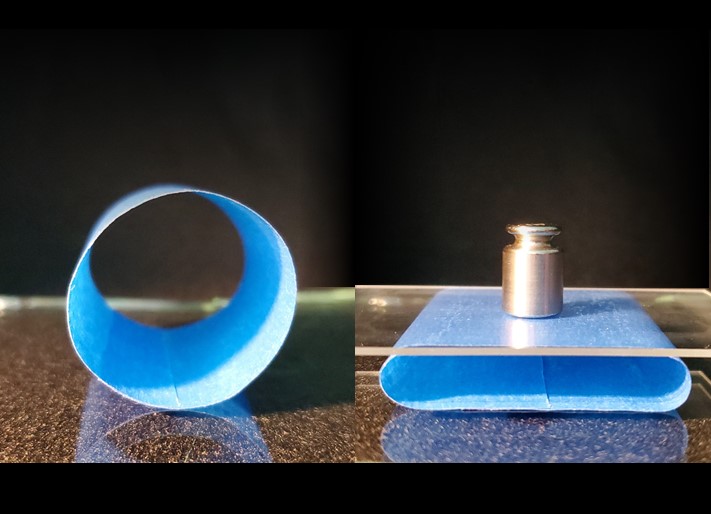
Fouling Resistant Surfaces
Navy vessels face many challenges during their deployments, however, some of the biggest might not be what you think. Below the waterline, many organisms attempt to colonize the ship hull, leading to increased drag and power consumption. Above the waterline, in cold waters, ice will build up leading to increased weight and decreased function. Better coatings could cure both problems at the same time! Dean Webster and Andrew Croll have partnered with Anish Tuteja (University of Michigan) and the Office of Naval Research in order to develop next-generation "solid-shedding surfaces".
"The field has largely been lead by thoughtful empirical work, but our goal is to determine simple, fundamental guidelines for designing these surfaces" said Croll. "We will examine how existing polymer coatings, next generation coatings, as well as model surfaces interact with water on large and small scales. The work should advance our understanding of soft, solvent filled surfaces, basic adhesive processes and measurements as well as have the payout of practical, scalable coating systems".
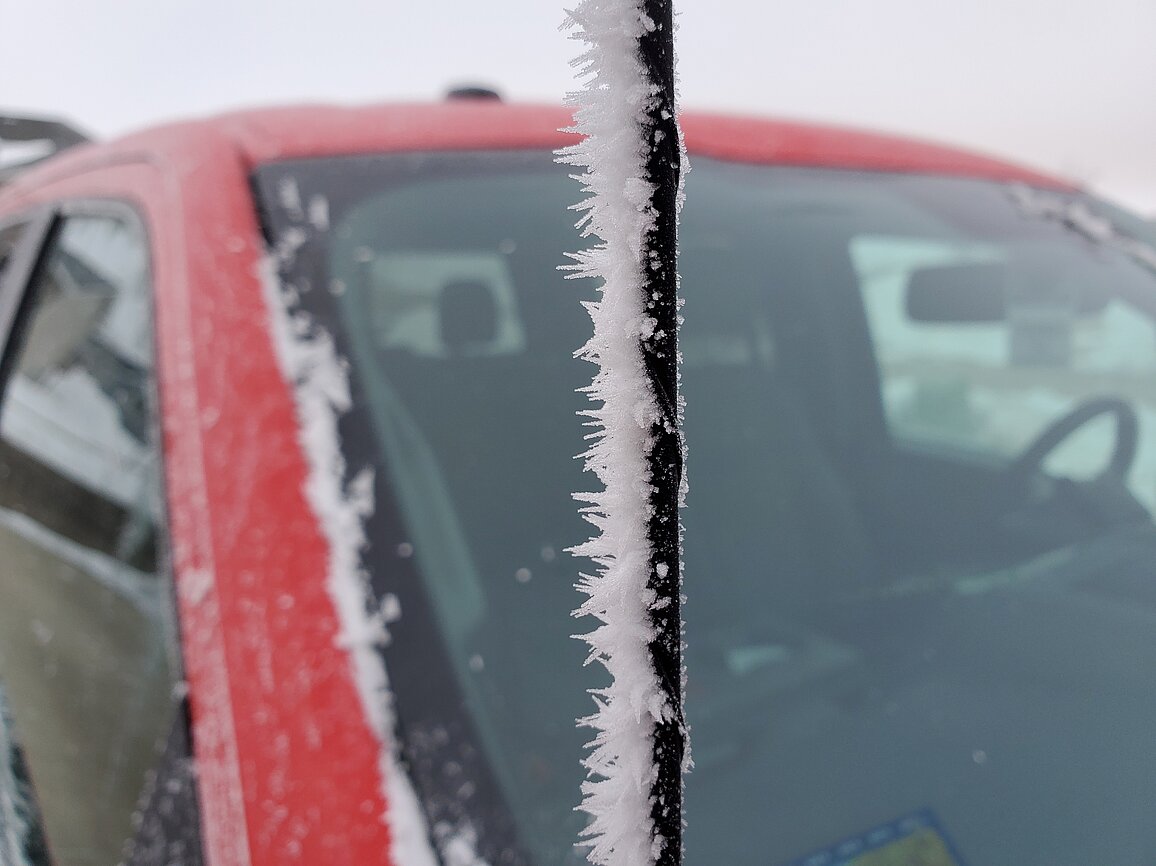
Andrei Kryjevski Receives NSF support!
Andrei Kryjevski is a co-PI on a grant funded by the National Science Foundation, which is entitled ``Modeling of Charge Transfer Processes in Heterostructured Nanocomposites". The award of $499,998 is for three-years. Developing energy sources that are both sustainable and efficient is one of the greatest challenges facing mankind. One attractive technology is solar-based fuel cells that utilize solar energy to create hydrogen from water, which is then used as a fuel which produces no harmful air pollutants. However, cost, efficiency, and durability are the main factors that hinder large-scale use of the fuel cells. One way to overcome these challenges is to utilize nanoparticles called quantum dots. A quantum dot is a piece of material which is few nanometers in size and contains just hundreds or thousands of atoms. It turns out properties of a quantum dot are significantly altered by attaching just a single molecule to its surface. This modification is done in a way that enhances properties of quantum dots needed for their uses in solar energy conversion to chemical or electrical energy, such as solar-based fuel cells. However, precise control over the processes governing interactions between molecules and quantum dots is currently lacking. To close this gap in our knowledge, Prof. Kryjevski, in collaboration with Profs. Kilina and Kilin (NDSU Chemistry) are developing and applying computational methods that model processes taking place in quantum dots with complicated surface structure. Computational predictions obtained from this research are expected to guide design of quantum dot-based materials for energy applications. This project serves students, industry, state, and the nation. It provides comprehensive instruction and research experience in the computational chemistry and physics for graduate and undergraduate students. Availability of remote training and research activities for this project is expected to increase participation of increase participation of individuals with family obligations and Native American students. Thus, this project helps train diverse STEM workforce with the skills and knowledge critical for the design of novel materials for energy applications.
Croll Group gains Army Research Office Support
The Croll group is proud to be working for the Army Research Office, through their recent grant "Guided Energy Absorption with Crumpled Polymer Sheets". The research, conducted in collaboration with Co-PI Wenjie Xia (Civil Engineering, NDSU), will examine how energy is absorbed as randomly folded films are crushed. The work will examine well-controlled polymer films created in the Croll Lab, as they are crushed by flat walls, sharp points, and other geometries at various different speeds, even up to ballistic. Professor Xia will model the systems with Coarse Grained Molecular Dynamics simulations, which will be tuned to the exact properties of the experimental systems. The work may lead to novel helmet design, packaging, and energy absorbing structures. Ph.D. student funding is available!
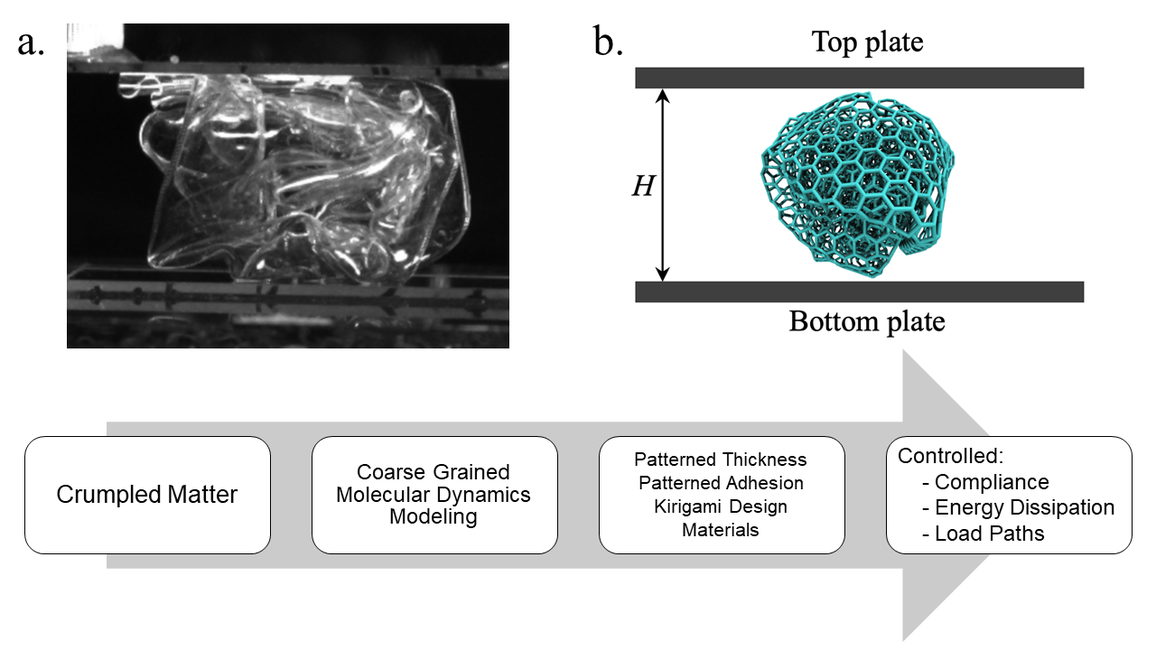
Alan Denton Receives NSF Grant
The department is excited to announce that Alan Denton's grant entitled "Response of Soft Colloids and Macromolecules to Crowded Environments: Theoretical and Computational Modeling.” was recently funded by the National Science Foundation. The three-year award of $266,039 will support theoretical and computational research to better understand and facilitate the design of smart materials, which are made of building blocks, such as soft colloidal particles and flexible macromolecules, whose size, shape, and softness respond to changes in external stimuli. Of particular interest are microgels, which are microscopic gel particles, made of porous, elastic networks of polymers (chain-like molecules) that swell by absorbing solvent. The degree of swelling can be controlled by adjusting temperature, acidity, and concentration of the solution, resulting in adaptive properties that equip microgels to serve as biosensors and drug delivery vehicles in the biomedical and pharmaceutical industries. While past experimental and modeling studies have explored elastic properties of single particles and collective behavior of bulk solutions, an outstanding challenge is to link single-particle and multi-particle properties of these materials. Specific unresolved issues concern the role of electric charge in determining microgel swelling and the influence of particle softness on macromolecular crowding in biological cells. Broader impacts of this project include development of novel theories and computer simulation algorithms that can guide the interpretation of experiments and design of smart materials; science outreach activities with students at K-12 schools and tribal colleges; and mentoring and training of graduate and undergraduate students for careers in computational science.
Dr. Mila Kryjevskaia Awarded James A. Meier Junior Professorship!!!
It is with great excitement that the Faculty of the Department of physics report that Mila Kryjevskaia has been awarded the James A. Meier Junior Professorship! In her 12 years at NDSU, Dr. Kryjevskaia has worked tirelessly to discover, use, and communicate to peers better teaching methods at NDSU. Her groundbreaking work on revealing and addressing conceptual challenges and cognitive errors encountered by students of physics has profoundly impacted faculty and students at all levels at NDSU and the world at large. We can think of no one who better fits the goals of this award, to recognize contributions to teaching through research, with the primary criterion of demonstrated success interacting with students.
Joining NDSU in 2008 as an Assistant Professor with a shared appointment in the Department of Physics (80%) and the School of Education (20%), Dr. Kryjevskaia has also been a leading member of the interdisciplinary STEM Education Doctoral Program from its inception. In 2015, she earned tenure and was promoted to Associate Professor. Since her start, Dr. Kryjevskaia has published many significant works, educated many educators and students, and received external funding for her research.
Congratulations Mila!
The professorship endowment is funded by James A. Meier, BS ’59, mathematics. He earned his chemistry doctorate in 1971 and an honorary doctorate from NDSU in 2007. The department would also like to thank James for founding and funding this prestigious professorship.
Physics Department COVID-19 Information
Chair's Statement:
"In view of the extended Pass/Fail Grading Option this semester, the Department of Physics will allow P grades to satisfy normal grade requirements for PHYS courses taken by Physics majors (including double majors) in the Spring 2020 semester. While we encourage students to opt for a letter grade, we also recognize that those who are disadvantaged by their current personal situation should not face additional barriers that delay progress or graduation. Those who make use of the Pass/Fail Grading Option will not be disadvantaged based on that choice."
-Sylvio May
Additional resources:
Pass/Fail grading option and Adjusted Spring Dates/Deadlines
Erik Hobbie Receives College of Science and Mathematics Research Award
Erik Hobbie has been awarded the College of Science and Mathematics Research Award. This is a great and well deserved honor for Erik, who is a faculty member who's appointment is a 60% Physics, 40% polymers and coatings split. In his 10 years at NDSU, Erik has built a thriving, internationally recognized research group, he has published 41 papers in high ranking journals and he has personally secured over 1 Million in external research funding. Several of his articles have been honored with journal covers. Most remarkably, he has done all this while leading NDSU’s Materials and Nanotechnology program, a significant administrative burden.
Erik’s early work in polymer science at the National Institute of Standards and Technology lead him to his current focus on light/nanoparticle interactions in soft materials. The driving goal of his plan is to make progress towards solutions for one of the world’s greatest challenges, the development of clean sources of energy. His work has focused on carbon and silicon nanostructures, specifically because these materials are abundant and non-toxic. While light can easily be harvested by cadmium-selinide particles, their environmental toxicity would kill any real-world application. It is this pragmatic view – that the research must not only solve big problems, but actually be usable – that makes Erik’s work so unique, and such a good fit to the values held by the people of the state of North Dakota.
BOO @ NDSU
On October 29, around twilight, Grad Phi students hosted a booth of science demonstrations and activities at Boo! at NDSU, a family-friendly, Halloween-themed carnival and trick-or-treating event organized by Residence Life. Over 750 costumed kids haunted Cater Hall and learned some tricks about cryogenics (liquid nitrogen and marshmallows), soft matter (soap films, slime and candy), and rotational motion (spinning wheel). A fun time was had by all.
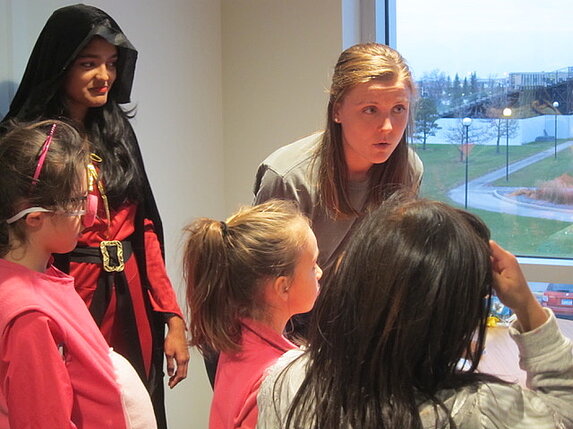
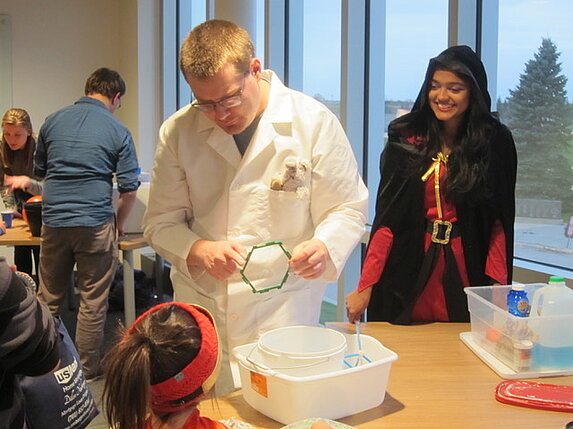
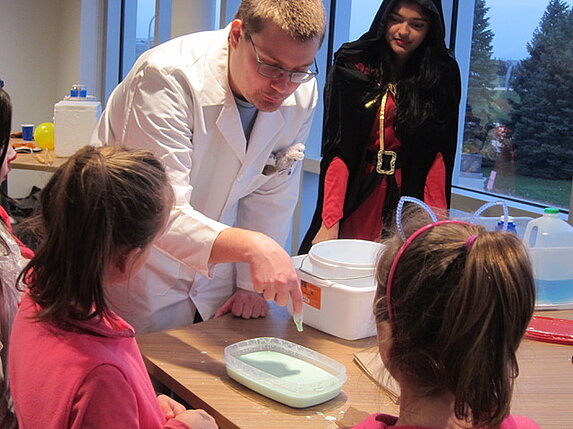
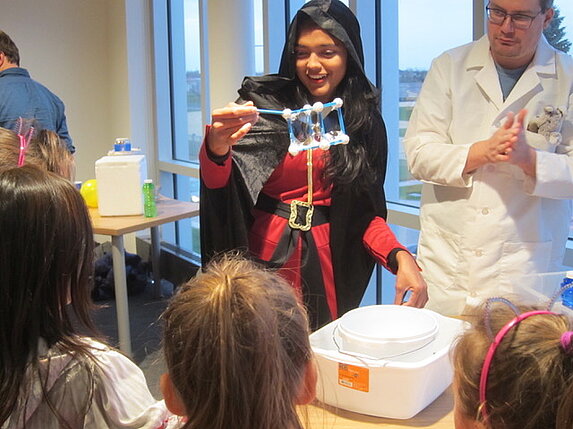
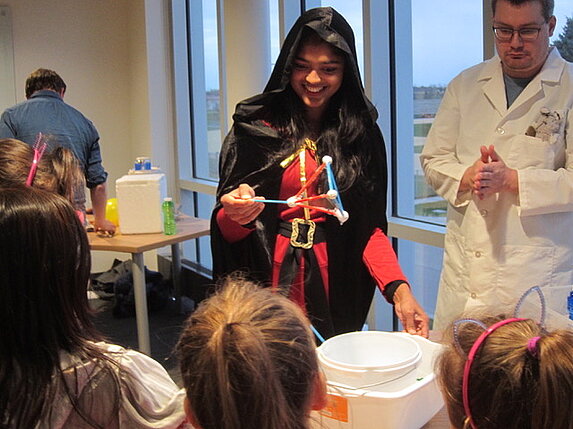
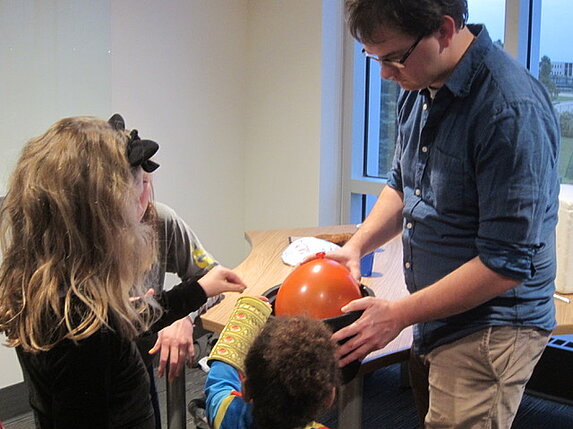
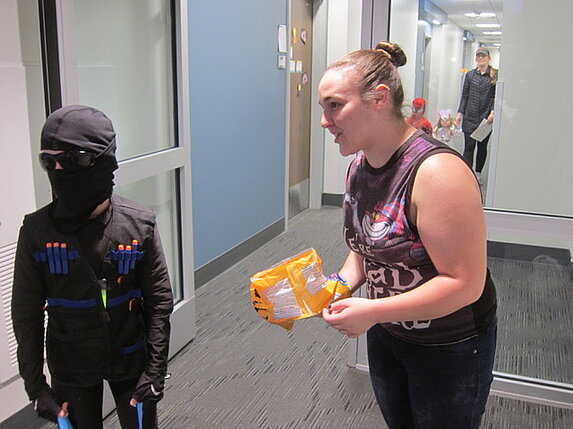
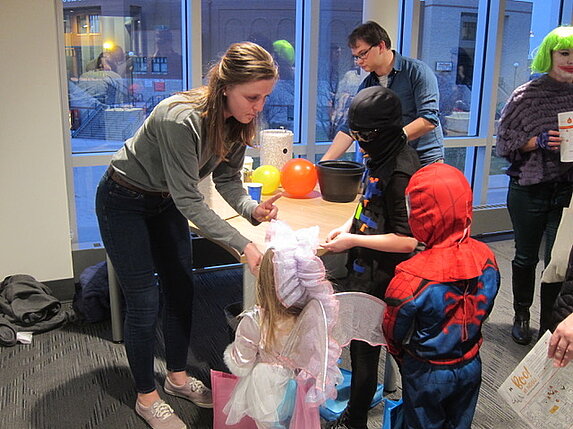
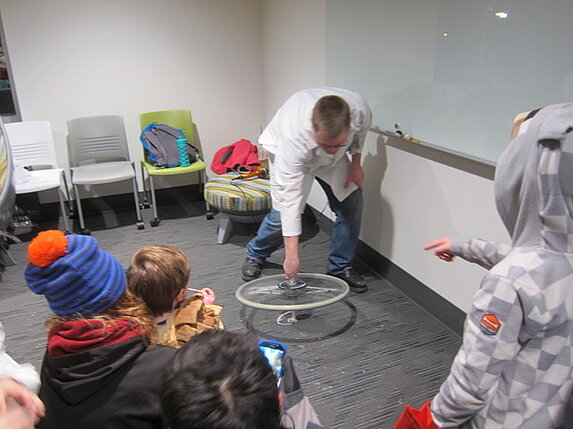
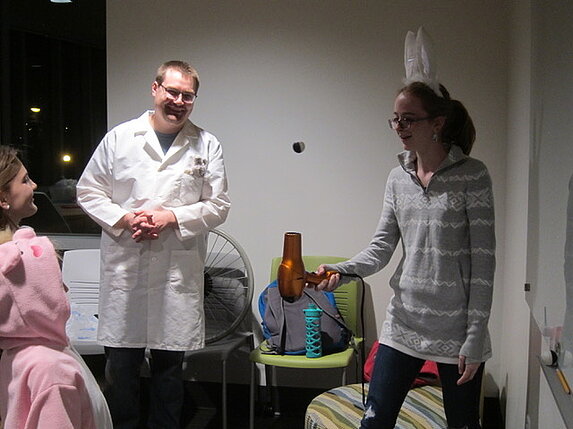
Red River Market Outreach
On October 5, the NDSU Physics Graduate Student Organization, Grad Phi, hosted a science outreach event at the Red River Market in downtown Fargo. Curious market-goers stopped by to learn about the science of soap bubbles, rotational motion, and optical illusions. Despite the rain, a good time was had by all!
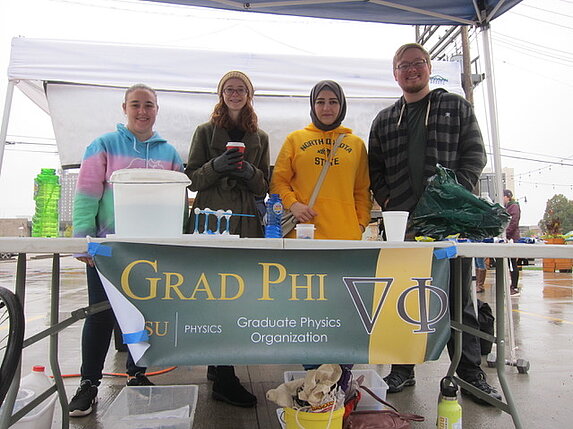
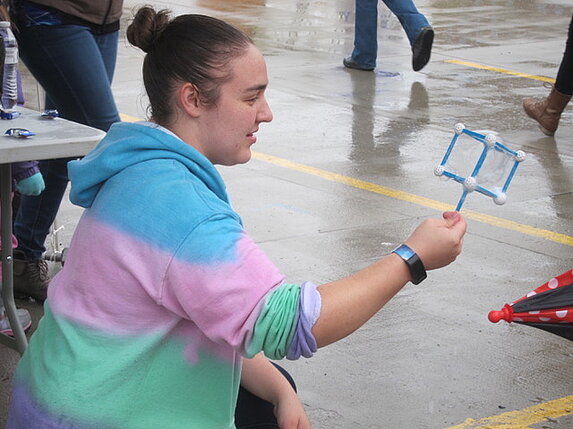
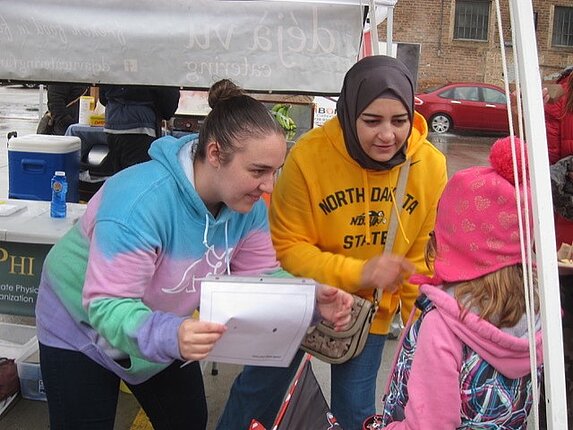
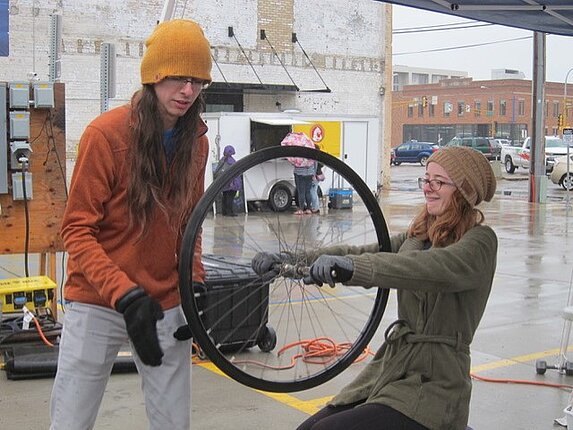
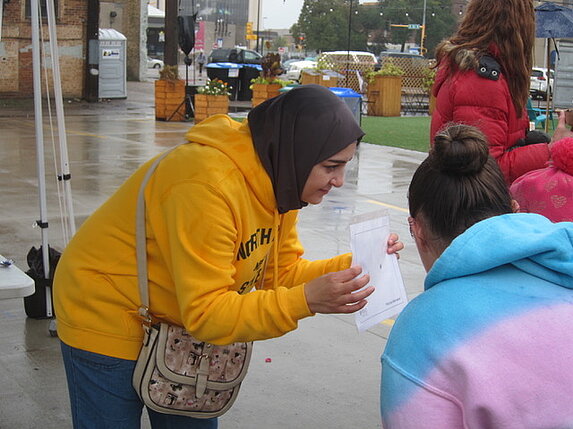
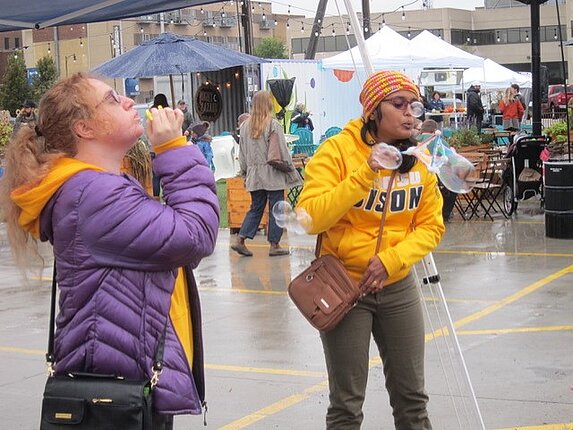
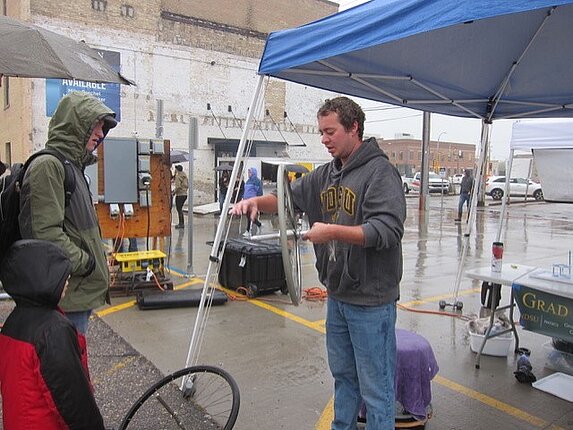
Research Paper Highlighted
Alan Denton and graduate student Mohammed Alziyadi have published a paper entitled "Osmotic pressure of permeable ionic microgels: Poisson-Boltzmann theory and exact statistical mechanical relations in the cell model" in the Journal of Chemical Physics. The work was honored as the "editor's pick", which means it stood out to the editor as a particularly interesting and important work. More great research from NDSU Physics!
Department Receives Advancing Inclusion Award!
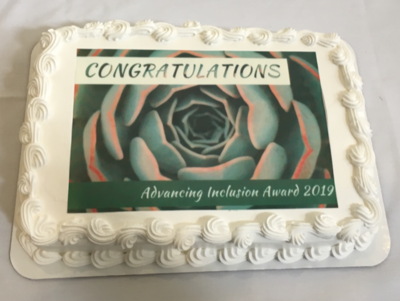
The department is quite honored and humbled to receive the "NDSU Advancing Inclusion Award" this year. The Advancing Inclusion Award is presented annually "to an NDSU department, committee, group or unit that has worked collaboratively to promote an inclusive culture by enhancing or contributing to the overall environment of the community or university.". The department is especially proud that its nomination came from the NDSU Physics Graduate Student Association. The department has taken great efforts to find and invest in programs and opportunities that create an inclusive atmosphere for students here at NDSU, and we hope that this is a good sign that it is paying off. Read more here.
Chair receives honor
Recently, Sylvio May was awarded the Ambassadors Excellence Award award by the NDSU College of Science and Mathematics Ambassadors (a student group). Sylvio was nominated for (among other things) his exceptional efforts in supporting student success in introductory physics courses. Sylvio holds great esteem for the award specifically because it was entirely driven by the students involved. Congratulations Sylvio!
Faculty Publishes in Nature Communications
The Croll research group has had a recent work published in the high-impact, open-access journal Nature Communications. The work is focused on understanding the strength of a crumpled ball - a rigid object created from a thin film (such as paper). Such an object is a complex collection of folds and verticies that somehow collectively give the system a significant resistance to compression. The system has significant potential for use as an engineering material akin to a foam, but one that is much more easily produced. Read about it here, where you can also find a link to the freely available article!
Student Awarded NSF Graduate Fellowship
Brianna Santangelo, was notified recently that she will receive a 2019 National Science Foundation Graduate Research Fellowship! This prestigious award is a significant national accomplishment that our entire department is proud of. The funding will allow Brianna to continue working towards her Ph.D. in physics, and more specifically to continue her research in physics education with her supervisor Mila Kryjevski. Read about the program here.
Experiments in Physics, performed by Alistair McInery, Lina Alhalhooly, Tim Twohig, Jamie Froberg, Rachel Downing Brian Farlow, Wathsala Jayawardana and Deyan Mihaylov, came in second place in the Avenues of Scientific Discovery Grad Student Competition. Congratulations all!



